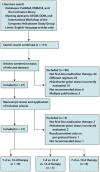The PRISMA statement for reporting systematic reviews and meta-analyses of studies that evaluate health care interventions: explanation and elaboration
- PMID: 19621070
- PMCID: PMC2707010
- DOI: 10.1371/journal.pmed.1000100
The PRISMA statement for reporting systematic reviews and meta-analyses of studies that evaluate health care interventions: explanation and elaboration
Abstract
Systematic reviews and meta-analyses are essential to summarize evidence relating to efficacy and safety of health care interventions accurately and reliably. The clarity and transparency of these reports, however, is not optimal. Poor reporting of systematic reviews diminishes their value to clinicians, policy makers, and other users.Since the development of the QUOROM (QUality Of Reporting Of Meta-analysis) Statement--a reporting guideline published in 1999--there have been several conceptual, methodological, and practical advances regarding the conduct and reporting of systematic reviews and meta-analyses. Also, reviews of published systematic reviews have found that key information about these studies is often poorly reported. Realizing these issues, an international group that included experienced authors and methodologists developed PRISMA (Preferred Reporting Items for Systematic reviews and Meta-Analyses) as an evolution of the original QUOROM guideline for systematic reviews and meta-analyses of evaluations of health care interventions.The PRISMA Statement consists of a 27-item checklist and a four-phase flow diagram. The checklist includes items deemed essential for transparent reporting of a systematic review. In this Explanation and Elaboration document, we explain the meaning and rationale for each checklist item. For each item, we include an example of good reporting and, where possible, references to relevant empirical studies and methodological literature. The PRISMA Statement, this document, and the associated Web site (http://www.prisma-statement.org/) should be helpful resources to improve reporting of systematic reviews and meta-analyses.
Conflict of interest statement
MC's employment is as Director of the UK Cochrane Centre. He is employed by the Oxford Radcliffe Hospitals Trust on behalf of the Department of Health and the National Institute for Health Research in England. This is a fixed term contract, the renewal of which is dependent upon the value placed upon his work, that of the UK Cochrane Centre, and of The Cochrane Collaboration more widely by the Department of Health. His work involves the conduct of systematic reviews and the support of the conduct and use of systematic reviews. Therefore, work–such as this manuscript–relating to systematic reviews might have an impact on his employment.
Figures




References
-
- Canadian Institutes of Health Research. Randomized controlled trials registration/application checklist (12/2006). 2006 Available: http://www.cihr-irsc.gc.ca/e/documents/rct_reg_e.pdf. Accessed 26 May 2009.
-
- Young C, Horton R. Putting clinical trials into context. Lancet. 2005;366:107–108. - PubMed
-
- Moher D, Tetzlaff J, Tricco AC, Sampson M, Altman DG. Epidemiology and reporting characteristics of systematic reviews. PLoS Med. 2007;4:e78. doi: 10.1371/journal.pmed.0040078. - DOI - PMC - PubMed
-
- Hemels ME, Vicente C, Sadri H, Masson MJ, Einarson TR. Quality assessment of meta-analyses of RCTs of pharmacotherapy in major depressive disorder. Curr Med Res Opin. 2004;20:477–484. - PubMed
Publication types
MeSH terms
Grants and funding
LinkOut - more resources
Full Text Sources
Other Literature Sources

